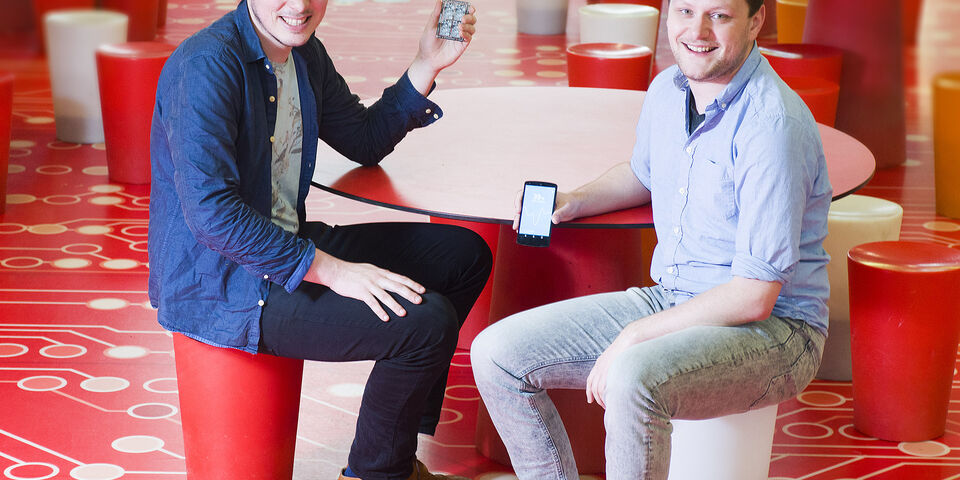Home Stretch | Flexible finger on the pulse
Portable measuring devices, such as step counters and heart rate monitors, are gaining in popularity among people who care about their health. In a joint graduation project, Industrial Design students Stijn Zoontjens and Yannick Brouwer made an open-source health tracker capable of reading signals emitted by arbitrary sensors and storing them on a removable memory card.
Zoontjens and Brouwer's creation is based on the Totem Health Sensor, a device incorporating an acceleration meter, a rotation sensor and a thermometer. "Because both the Totem's hardware and software are open source,” explains Brouwer, "anyone can develop the device.”
The two friends decided to add the functionality of reading and storing analog signals emitted by arbitrary sensors. Not on a server in the US, as is often the case for commercial health trackers, but simply on an SD card. "That way you stay in charge of your data," says Zoontjens. “You can simply remove the memory card and, say, give it to your family doctor to analyze.”
Moreover, they believe, the flexibility of their little device - which they have dubbed Totem Pop - makes it ideal for scientists and designers. “If we and our fellow students at Industrial Design are developing a new product," says Zoontjens, "we want to be able to test whether a function works as quickly as possible so that we can make improvements and repeat the testing.”
For that, a platform that you can easily plug sensors into and that you can reprogram using a smartphone app - an option the final-year students are still working on - is just perfect. “At the moment we often have to take yet another new printed circuit board and solder components on to it," says Brouwer. "Unless you are a Electrical Engineering student, that's complicated stuff, and the small format of portable devices makes the soldering job especially tricky.”
Now the design students have a working prototype ready, they are getting enthusiastic reactions. “For a long while, the people at Totem were skeptical, but now they too seem convinced that this can be a standard product,” says Zoontjens. “I've already heard people from Delft saying they would really like to have the Totem Pop,” adds Brouwer.
So there is a good chance that their project won't be shelved. “All too often, unfortunately, that is the fate of graduation projects. We are going to invest time and energy in producing the documentation, and next year a whole team of students will likely take it further”.
A joint graduation project is also unusual at the Department of Industrial Design. “Before we started, we discussed our graduation subject a lot, and we came to the conclusion that we wanted to achieve roughly the same thing and we would complement each other well,” explains Zoontjens. “We reckoned two people can get much further than one. So we decided to do something crazy and find out whether it was allowed; luckily the department is pretty flexible. And we still haven't argued!”


Discussion